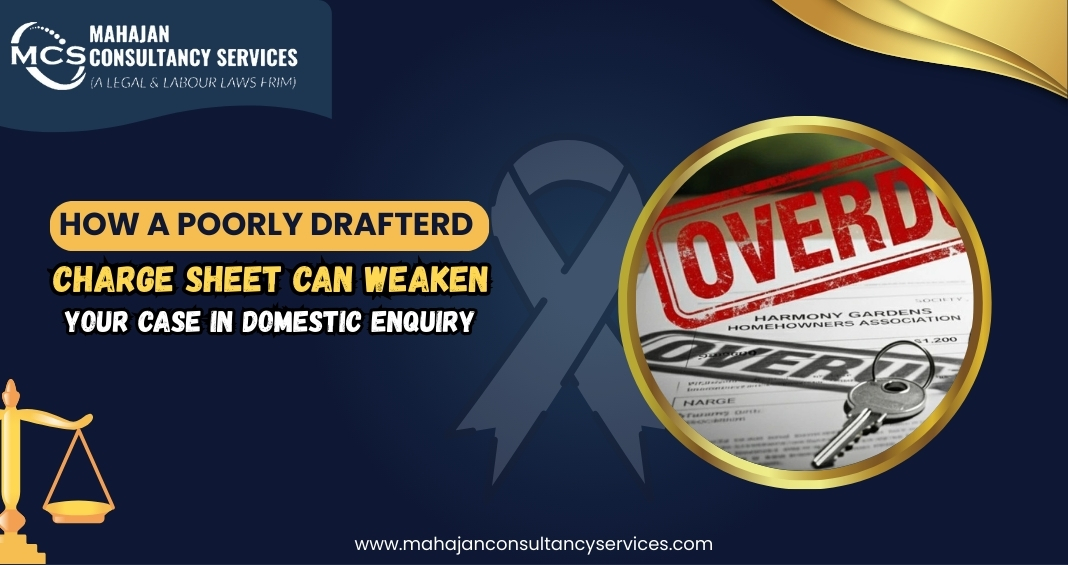A domestic enquiry is a crucial aspect of managing employee relations in any business, especially when there are accusations of misconduct. The charge sheet is one of the foundational documents in the process. It serves as the written statement outlining the accusations against an employee and the evidence supporting the charges. While it may seem like a simple formality, a poorly drafted charge sheet can severely weaken your case and expose your organization to unnecessary legal risks. In this blog, we’ll delve into how vague or improperly drafted charge sheets can hurt your business and why expert legal assistance is necessary to shield yourself from potential litigation.
What is a Charge Sheet in a Domestic Enquiry?
A charge sheet in the context of a domestic enquiry is an official document that informs an employee of the charges leveled against them. It outlines the specific allegations, incidents, or misconduct, often with references to company policies, regulations, or the law. The employee is then expected to respond to the charges either in writing or in a formal hearing.
The charge sheet is a vital document because it sets the stage for the entire enquiry process. If it is not crafted carefully, the employee can challenge it in court, thereby weakening the employer’s case or leading to legal consequences.
The Risk of a Vaguely Written Charge Sheet
There are various risks associated with a vaguely written charge sheet which include:
1. Lack of Specificity
One of the most common pitfalls in drafting charge sheets is using vague or generalized language. For example, if a charge sheet states that the employee “acted unprofessionally,” without specifying the behavior in question, it leaves room for interpretation. This lack of clarity can give the employee an opportunity to challenge the charges on the grounds of insufficient evidence.
Legal experts stress that a charge sheet must be precise and specific in its allegations. The incidents must be described in detail, including dates, times, locations, and the nature of the misconduct. A general statement like “violating company policies” without supporting facts or references can be easily dismissed, and the employee could argue that they are unaware of the policy or were not properly informed of the rules.
2. Legal Inadequacies
A charge sheet that lacks the appropriate legal terminology or reference to relevant laws and company policies can be easily undermined in a domestic enquiry. For instance, if the charge sheet does not mention which specific company policy or law was violated, the employee could argue that the charges are unfounded or legally baseless. This could result in a significant disadvantage for the business, especially if the case is escalated to a legal forum.
Additionally, poorly drafted charge sheets may not follow the correct procedural norms, which could lead to delays, complications, or even a dismissal of the enquiry. Without the appropriate legal language and structure, the charge sheet may violate the principles of natural justice, leading to a potential miscarriage of justice and opening up your company to fines.
3. Unclear Instructions for Response
Another issue with poorly drafted charge sheets is the lack of clear instructions for the employee on how to respond to the charges. A charge sheet should not only list the allegations but also provide a clear timeline and procedure for the employee to submit their defense. If these details are omitted or vaguely outlined, it could create confusion and may give the employee grounds to challenge the fairness of the enquiry. In certain cases, an employee may argue that they were not given a fair chance to respond, which can harm the employer’s position.
4. Ambiguity in Evidence Presentation
In a domestic enquiry, evidence is the cornerstone of the case. A well-drafted charge sheet should reference the evidence that supports the allegations against the employee. However, when a charge sheet is poorly written, the evidence may be mentioned without adequate context or clarity. For example, vague references like “evidence from witnesses” or “video footage” without specifying the exact nature of the evidence can create doubts about its credibility.
Without a clear explanation of how the evidence relates to the charges, the employee may challenge its relevance. This can undermine the integrity of the entire enquiry process and make it difficult for the employer to prove their case.
5. Copy-Paste Charge Sheets: A Recipe for Disaster
A major red flag is the trend of businesses using generic or “template” charge sheets found online or generated by artificial intelligence. These templates may appear to be quick solutions, but they often lack the necessary customization to address specific allegations or the particularities of the business and its policies.
Many times, these templates fail to account for the nuances of the individual case and could result in a charge sheet that does not reflect the seriousness of the allegations. Relying on AI or templates for drafting charge sheets leaves the business vulnerable to mistakes, inconsistencies, and legal weaknesses that can easily be exploited by an employee or their legal counsel.
The dangers of using generic or AI-generated charge sheets are twofold. First, they lack the level of personalization and detail that a well-drafted charge sheet requires. Second, they fail to account for any changes in legal requirements or best practices. As a result, these documents may not meet the legal standards required to withstand scrutiny in a domestic enquiry or court of law. It is necessary to draft charge sheets catered to your corporate needs in a clear language to avoid being vulnerable from legal battles.
How a Poorly Drafted Charge Sheet Can Weaken Your Legal Position
1. Challenging the Validity of Charges
When a charge sheet is unclear, ambiguous, or legally deficient, the employee may contest the validity of the charges themselves. For example, if the charge sheet fails to adequately reference the company policies or statutory regulations that were allegedly violated, the employee could argue that the charges are baseless. This can shift the burden onto the employer to prove the legitimacy of the charges, potentially derailing the entire enquiry.
2. Increasing the Risk of Legal Liabilities
A flawed charge sheet can increase the likelihood of litigation. An employee who feels that the charge sheet is unfairly written may challenge the domestic enquiry in court. In such cases, if the charge sheet does not meet the legal standards, the court may rule in favor of the employee, leading to significant financial costs, reputational damage, or even a requirement to reinstate the employee.
3. Weakening Employee Morale
A poorly drafted charge sheet can also have unintended consequences on employee morale. When employees perceive that the disciplinary process is unfair or lacks clarity, it may lead to dissatisfaction, frustration, and a breakdown in trust between management and staff. If the enquiry process is seen as arbitrary or unprofessional, it can contribute to a toxic work environment and increase the risk of disputes within the organization.
Why You Need Expert Legal Assistance in Drafting Charge Sheets
Drafting a strong, legally sound charge sheet requires expertise and attention to detail. While it may seem like an administrative task, its importance cannot be overstated. An expert legal consultant can help ensure that your charge sheet is:
- Legally precise: Accurately referencing company policies, industry regulations, and legal precedents.
- Clear and specific: Avoiding vague language and ensuring that each allegation is clearly substantiated by facts.
- Structured according to due process: Providing clear instructions on how the employee can respond, thereby protecting the rights of both the employer and the employee.
- Custom tailored: Taking into account the unique circumstances of the situation to prevent generic statements that could undermine the case.
At Mahajan Consultancy, we specialize in drafting charge sheets and other legal documents that are tailored to your business needs, protecting you from potential legal risks and ensuring compliance with applicable laws. Our expertise in employment law can help shield your business from unnecessary litigation and provide you with peace of mind.
FAQs
- What is a charge sheet in a domestic enquiry?
A charge sheet is a formal document that outlines the charges against an employee in a domestic enquiry and serves as the foundation for disciplinary proceedings. - Can a poorly drafted charge sheet be legally challenged?
Yes, if a charge sheet is vague or legally inadequate, an employee can challenge the charges in court, potentially invalidating the entire enquiry. - Why is specificity important in a charge sheet?
Specificity ensures that the employee clearly understands the allegations, and it provides a solid basis for disciplinary action, reducing the chance of the case being dismissed. - What risks do businesses face from using template charge sheets?
Template charge sheets may lack necessary details, making them legally inadequate and leaving the business vulnerable to challenges in a domestic enquiry. - How can a vague charge sheet affect employee morale?
If employees perceive the charge sheet process as unfair or unclear, it can lead to dissatisfaction, reduced trust, and potential disputes within the organization. - Can a poorly written charge sheet result in legal consequences?
Yes, businesses risk legal liabilities, including the possibility of a court ruling in favor of the employee, financial penalties, or even reinstatement of the employee. - What makes a charge sheet legally sound?
A charge sheet must clearly specify the allegations, cite relevant policies or laws, provide evidence, and adhere to due process requirements to be legally effective. - What role does Mahajan Consultancy play in drafting charge sheets?
Mahajan Consultancy provides expert legal support to help businesses draft clear, precise, and legally sound charge sheets that protect them from legal risks. - Can an employee challenge the fairness of a domestic enquiry?
Yes, if the charge sheet is poorly written or procedurally flawed, the employee can argue that the enquiry is unfair and challenge its validity in court. - How can businesses prevent legal disputes related to charge sheets?
By seeking expert legal assistance to draft charge sheets that meet legal standards and are tailored to the specific circumstances, businesses can mitigate the risk of legal disputes.




